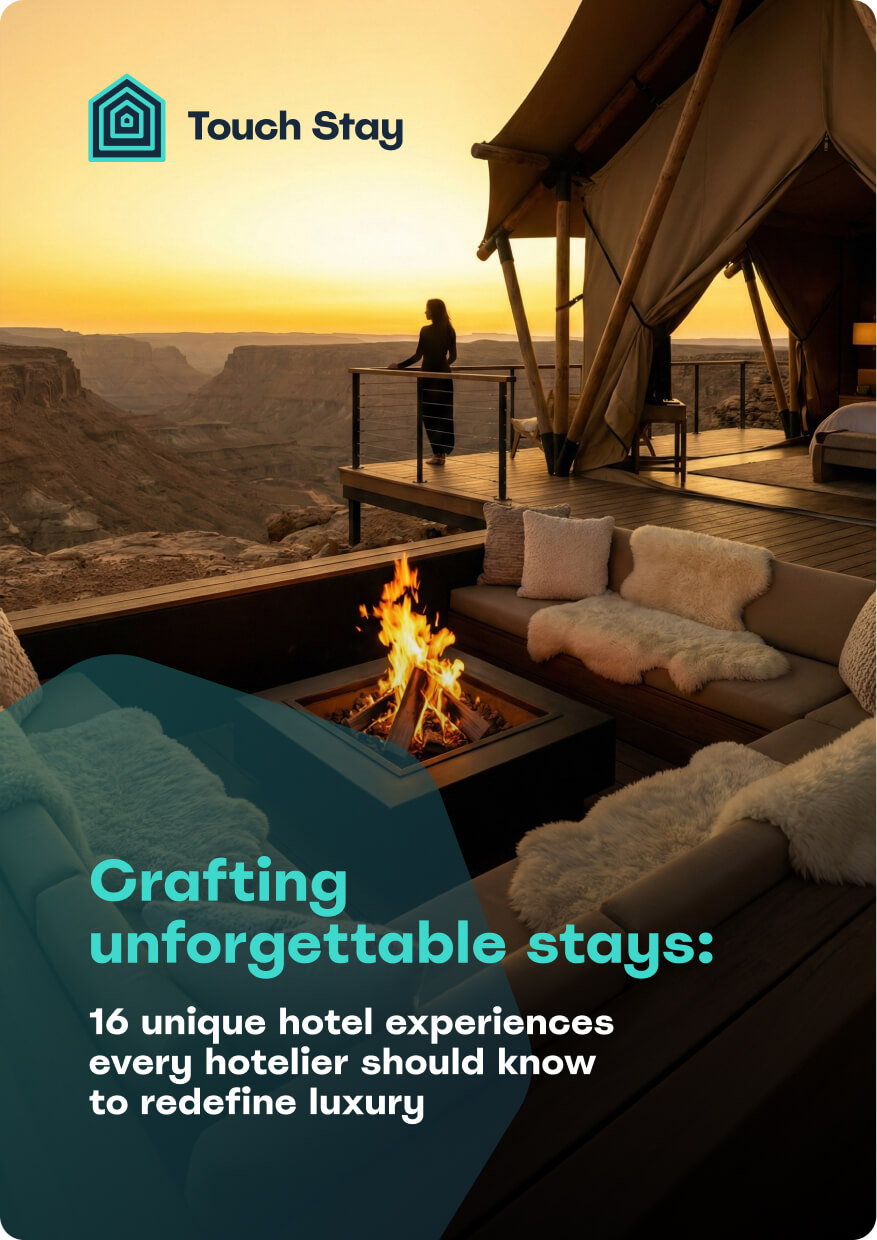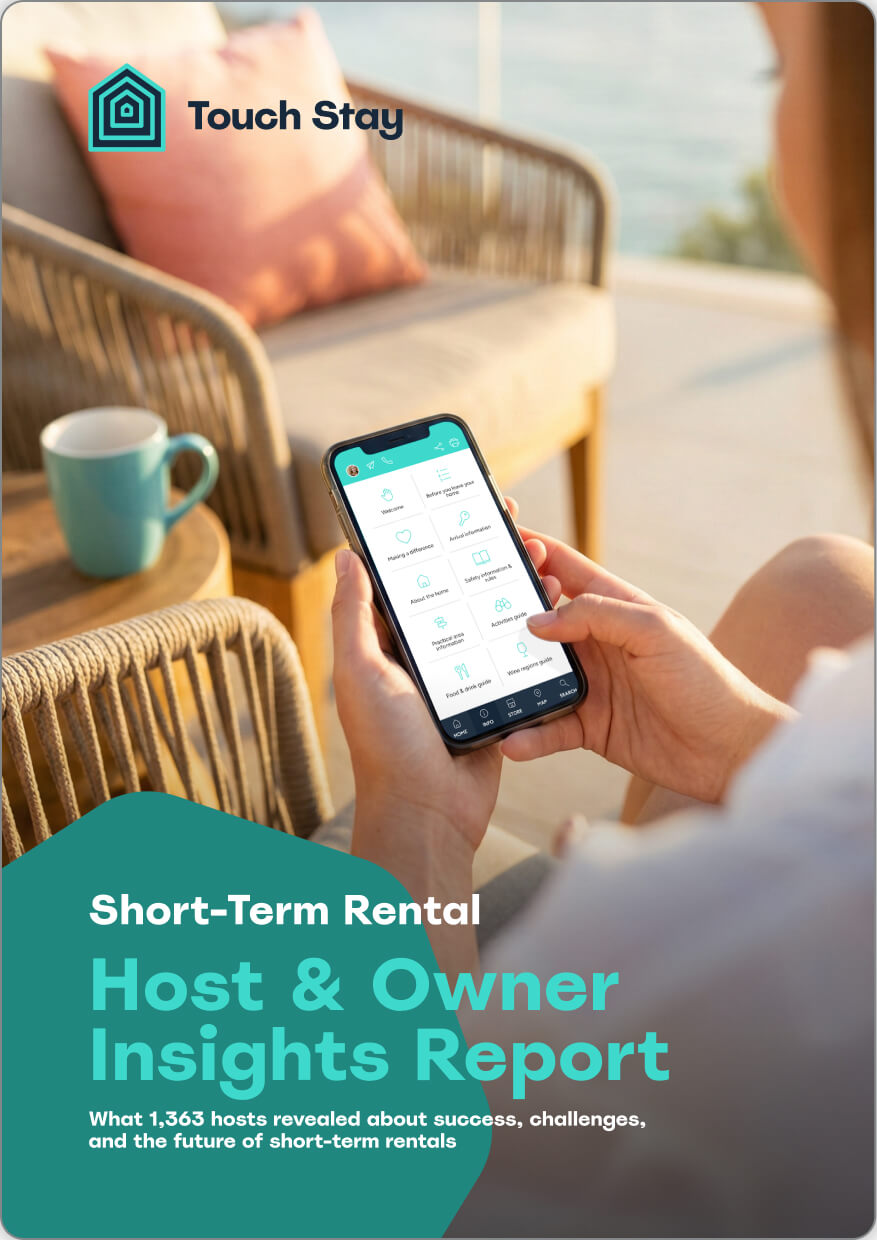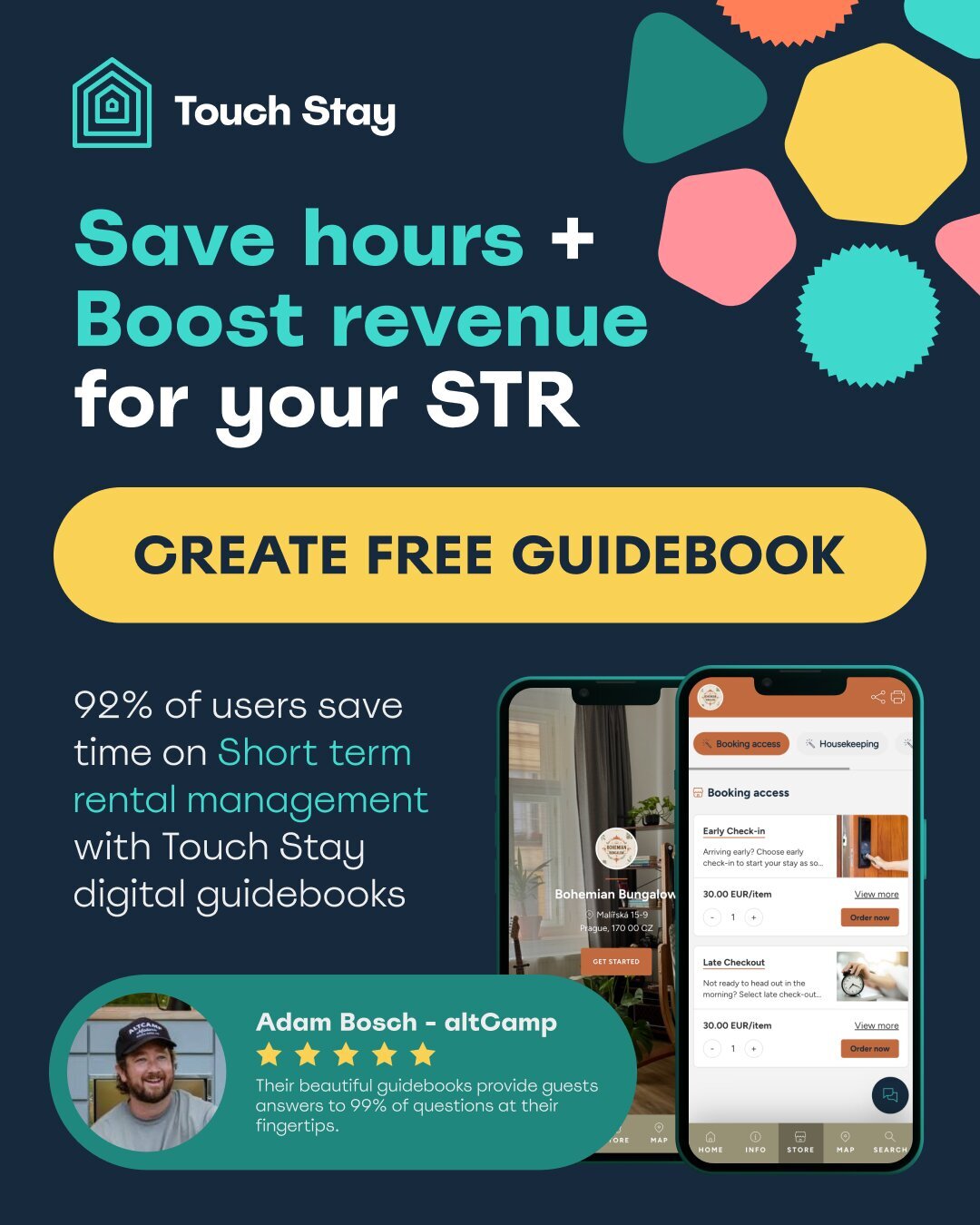As a property owner or host in the vacation rental industry, choosing the right platform to list your property can significantly impact your success. Two of the most popular options are Airbnb and Vrbo (Vacation Rentals by Owner). But which one is better for hosts? In this comprehensive guide, we'll dive deep into the Airbnb vs. Vrbo debate, exploring the pros and cons of each platform from a host's perspective while also considering traveller preferences.
Whether you're new to vacation rentals or looking to expand your hosting business, this article will help you make an informed decision about which platform aligns best with your goals. We'll cover everything from pricing and fees to user experiences and traveller demographics, giving you a clear picture of what to expect from each platform.
Before we dive in, it's worth noting that regardless of which platform you choose, providing an excellent guest experience is crucial. One way to enhance your guests' stay is by offering a comprehensive digital guidebook. Touch Stay's digital guidebooks are an excellent tool for hosts to share property details, local recommendations, and crucial information with guests, ensuring a smooth and enjoyable stay.
Read on to discover:
- Introduction to Airbnb and Vrbo
- Key differences between Airbnb and Vrbo for hosts
- Pros and cons of Airbnb and Vrbo for hosts
- Understanding traveller preferences on Airbnb and Vrbo
- Airbnb vs. Vrbo: pricing and fees for hosts
- Getting listed on Airbnb vs. Vrbo
- Conclusion: which platform is better for you as a host?
- FAQ
What are Airbnb and Vrbo?
Before we delve into the comparison, let's briefly introduce both platforms:
Airbnb:
Founded in 2008, Airbnb has become a household name in the short-term rental industry. It offers a diverse range of accommodations, from shared rooms to entire homes, and even unique stays like treehouses or houseboats. Airbnb caters to a wide audience, including budget travellers, luxury seekers, and business professionals.
Vrbo:
Vrbo, which stands for Vacation Rentals by Owner, has been around since 1995 and is now part of the Expedia Group. Vrbo focuses exclusively on entire home rentals, catering primarily to families and groups looking for vacation homes. It doesn't offer shared spaces or individual rooms.
Both platforms provide tools for hosts to list their properties, manage bookings, and communicate with guests. However, their approaches and target audiences differ, which can significantly impact a host's experience and success on each platform.
Key differences between Airbnb and Vrbo for hosts
When comparing Airbnb vs. Vrbo, hosts should be aware of several key differences that could influence their choice:
- Property types:
- Airbnb allows a wide variety of listings, including shared rooms, private rooms, and entire homes.
- Vrbo only permits entire home rentals, focusing on vacation properties.
- Target audience:
- Airbnb attracts a diverse crowd, from solo travellers to families, and caters to various budgets.
- Vrbo primarily targets families and groups looking for vacation homes, often for longer stays.
- Booking process:
- Airbnb offers both instant booking and request-to-book options.
- Vrbo allows hosts to choose between instant book, 24-hour review, or a custom review period.
- Host tools and features:
- Airbnb provides a more extensive set of tools, including a mobile app for hosts, professional photography services, and Airbnb Experiences.
- Vrbo offers solid management tools but may have fewer additional features compared to Airbnb.
- Global reach:
- Airbnb has a stronger global presence and brand recognition.
- Vrbo is well-known in the US but may have less recognition in some international markets.
- Cancellation policies:
- Airbnb offers more flexibility in cancellation policies, ranging from flexible to strict.
- Vrbo's cancellation policies are generally set by the host but tend to be more rigid.
Understanding these differences is crucial for hosts when deciding between Vrbo or Airbnb. Your choice may depend on factors such as your property type, target guests, and business goals.Pros and cons of Airbnb and Vrbo for hosts
To help you determine whether Airbnb or Vrbo is better for your hosting needs, let's break down the pros and cons of each platform:
Airbnb pros for hosts
- Larger user base: Airbnb boasts a massive global user base, potentially leading to more bookings and exposure for your property.
- Diverse listing options: you can list various property types, from spare rooms to entire homes, appealing to a wider range of travellers.
- Strong brand recognition: Airbnb's powerful brand can attract guests who might not be familiar with your specific location.
- Robust host tools: Airbnb offers comprehensive tools for pricing, calendar management, and guest communication.
- Airbnb Experiences: hosts can offer unique local experiences, potentially increasing their income and guest engagement.
Airbnb cons for hosts
- Higher competition: the platform's popularity means you're competing with many other listings in your area.
- Lower average nightly rates: due to the diverse range of accommodations, average nightly rates can be lower compared to Vrbo.
- Stricter policies: Airbnb may have more stringent policies and expectations for hosts to maintain their listing status.
- Potential for short-term stays: you might experience more frequent turnover with shorter average stay durations.
Vrbo pros for hosts
- Focus on vacation rentals: Vrbo caters specifically to travellers seeking vacation homes, potentially leading to longer stays and higher-value bookings.
- Family-oriented: the platform attracts more families and groups, which can mean more stable, predictable bookings.
- Less competition: with fewer listings than Airbnb, your property might stand out more easily.
- Higher average nightly rates: Vrbo's focus on entire homes often results in higher average nightly rates for hosts.
Vrbo cons for hosts
- Smaller user base: Vrbo has fewer users compared to Airbnb, potentially resulting in fewer booking inquiries.
- Limited property types: you can only list entire properties, which may not suit all hosts.
- Less brand recognition: while well-known in the US, Vrbo may have less global brand recognition.
- Fewer additional features: Vrbo offers fewer supplementary features compared to Airbnb's expansive platform.
When weighing Airbnb vs. Vrbo, consider these pros and cons in relation to your specific property and hosting goals. Some hosts even choose to list on both platforms to maximise their exposure and bookings.
Understanding traveller preferences on Airbnb and Vrbo
To make an informed decision between Airbnb and Vrbo, it's essential to understand traveller preferences on each platform. This knowledge can help you tailor your listing and choose the platform that best matches your target guests.
Airbnb Traveller Profile
- Age range: typically attracts a younger demographic, with a significant portion of users under 35.
- Travel style: appeals to adventure seekers, urban explorers, and those looking for unique experiences.
- Budget: caters to a wide range of budgets, from budget-conscious travellers to luxury seekers.
- Trip duration: often used for shorter stays, including weekend getaways and city breaks.
- Booking behaviour: more likely to book last-minute and value flexibility in cancellation policies.
Vrbo traveller profile
- Age range: generally attracts an older demographic, with many users being families or groups.
- Travel style: popular among those seeking a "home away from home" experience for vacations.
- Budget: often attracts travellers with higher budgets, looking for entire homes for family vacations.
- Trip duration: typically sees longer average stay durations, often a week or more.
- Booking behaviour: bookings are often made further in advance, with travellers planning family vacations.
Understanding these traveller preferences can help you decide whether Airbnb or Vrbo is better suited for your property and target guests. For example, if you have a cosy apartment in a vibrant city centre, Airbnb might be more appropriate. On the other hand, if you're renting out a spacious beach house, Vrbo could be the better choice.
Airbnb vs. Vrbo: pricing and fees for hosts
When comparing Airbnb vs. Vrbo, understanding the pricing structures and fees is crucial for hosts. Here's a breakdown of the costs associated with each platform:
Airbnb pricing and fees
- Host service fee:
- Typically 3% of the booking subtotal except when the host connects via an API with their Property Management System (PMS) and takes on the entire service fee. In these cases, the fee is 16%, leading to a 0% service fee for the guest.
- Payment processing fee:
- Included in the host service fee
- Listing fee:
- Free to list your property
- Guest service fee:
- Usually between 5% to 15% of the booking subtotal, paid by the guest
5. Merchant of Record (MOR):
- Airbnb acts as the MOR for all hosts and property managers, controlling all monies and paying out the day after guest arrival, regardless of API connection.
Check out our comprehensive blog on Airbnb fees to learn more.
Vrbo pricing and fees
- Host service fee:
- Option 1: annual subscription fee of $699 per property (existing accounts only)
- Option 2: pay-per-booking fee of 5% per booking + 3% payment processing fee
- Payment processing fee:
- 3% (included in the pay-per-booking option)
- Listing fee:
- Free to list your property
- Guest service fee:
- Typically between 6% to 12% of the booking subtotal, paid by the guest
5. Merchant of Record (MOR):
- Vrbo allows the host/property manager, if API connected with their PMS, to take payments and act as the MOR, giving them control over the monies and receiving funds without delay.
- If not API connected, Vrbo is the MOR and the host pays the 3% processing fee, with monies sent after arrival unless the host has been grandfathered in to receive the funds sooner.
When deciding between Vrbo or Airbnb, consider how these fee structures align with your hosting strategy. If you anticipate a high volume of bookings, Vrbo's annual subscription might be more cost-effective. However, if you're just starting out or have seasonal rentals, Airbnb's or Vrbo's pay-per-booking model might be more suitable.
Getting listed on Airbnb vs. Vrbo
The process of listing your property is an important factor when choosing between Airbnb and Vrbo. Here's a step-by-step comparison:
Listing on Airbnb
- Create an Airbnb account
- Click on "Become a Host" and choose your property type
- Add detailed information about your space, amenities, and house rules
- Set your pricing and availability
- Upload high-quality photos (Airbnb offers free professional photography in some areas)
- Set up your host profile
- Submit your listing for review
Read our blog to learn how to optimise your property listing on Airbnb.
Listing on Vrbo
- Create a Vrbo account
- Click on "List Your Property" and select your property type
- Provide detailed property information, including amenities and policies
- Set your rates and availability
- Upload photos and videos of your property
- Create your host profile
- Choose your subscription plan (annual or pay-per-booking)
- Publish your listing
Both platforms offer user-friendly interfaces for creating listings, but Airbnb generally provides more guidance throughout the process. Vrbo's setup is straightforward but may require more independent decision-making from hosts.
Regardless of which platform you choose, remember that a comprehensive digital guidebook can significantly enhance your guests' experience. Touch Stay's digital guidebooks for hosts allow you to provide all necessary information about your property and local area in an easily accessible format, potentially leading to better reviews and more bookings.
Conclusion: which platform is better for you as a host?
After comparing Airbnb vs. Vrbo across various aspects, it's clear that both platforms have their strengths and potential drawbacks. The best choice for you depends on your specific circumstances, property type, and hosting goals.
Choose Airbnb if:
- You have a diverse range of property types (including shared spaces)
- You're targeting a younger, more diverse demographic
- You value a larger user base and global reach
- You're interested in offering unique experiences alongside your accommodation
Choose Vrbo if:
- You're renting out entire homes or vacation properties
- Your target audience is primarily families or larger groups
- You prefer longer-term bookings
- You're looking for potentially higher nightly rates
Remember, the debate of "is Vrbo better than Airbnb" or "is Airbnb or Vrbo better" doesn't have a one-size-fits-all answer. Many successful hosts list on both platforms to maximise their exposure and bookings.
Whichever platform you choose, focus on providing an exceptional guest experience. Utilise tools like Touch Stay's digital guidebooks to enhance your guests' stay and set your property apart from the competition.
Start your hosting journey with a:
FAQ
The main difference is that Vrbo focuses exclusively on entire home rentals, while Airbnb offers a wider variety of accommodations, including shared spaces and private rooms.
Vrbo is often considered better for families as it specialises in entire home rentals, which are typically more suitable for family vacations. However, Airbnb also offers many family-friendly options.
This depends on your booking volume and chosen fee structure. Airbnb typically charges a 3% host fee per booking, while Vrbo offers an annual subscription or a per-booking fee. Calculate based on your expected bookings to determine which is more cost-effective for you.
Yes, many hosts list on both platforms to maximise their exposure and bookings. Just ensure you have a system to manage your calendar across both platforms to avoid double bookings.
Both platforms offer host support, but Airbnb is often praised for its more comprehensive host tools and resources. However, experiences can vary, and it's worth exploring both platforms' support options.
Airbnb generally has a stronger international presence and brand recognition. Vrbo is well-known in the US but may have less recognition in some international markets.
Remember, whether you choose Airbnb, Vrbo, or both, providing a great guest experience is key to your success as a host. Consider using Touch Stay's digital guidebooks to enhance your guests' stay and streamline your hosting process.

Ned
Ned has clocked up over 11 years in digital marketing and comms, with a strong focus on creating engaging content for a range of brands and agencies. When he’s not writing, he can be found digging for records, peering through his telescope at the night sky, or onboard his local lifeboat where he volunteers as a crewmember.
Be the first to know!
Join our newsletter for early access to:
- ✅ Free guides
- ✅ Pro tips & tricks
- ✅ Time saving tutorials
- ✅ Latest blog posts
- ✅ Checklists & templates






















